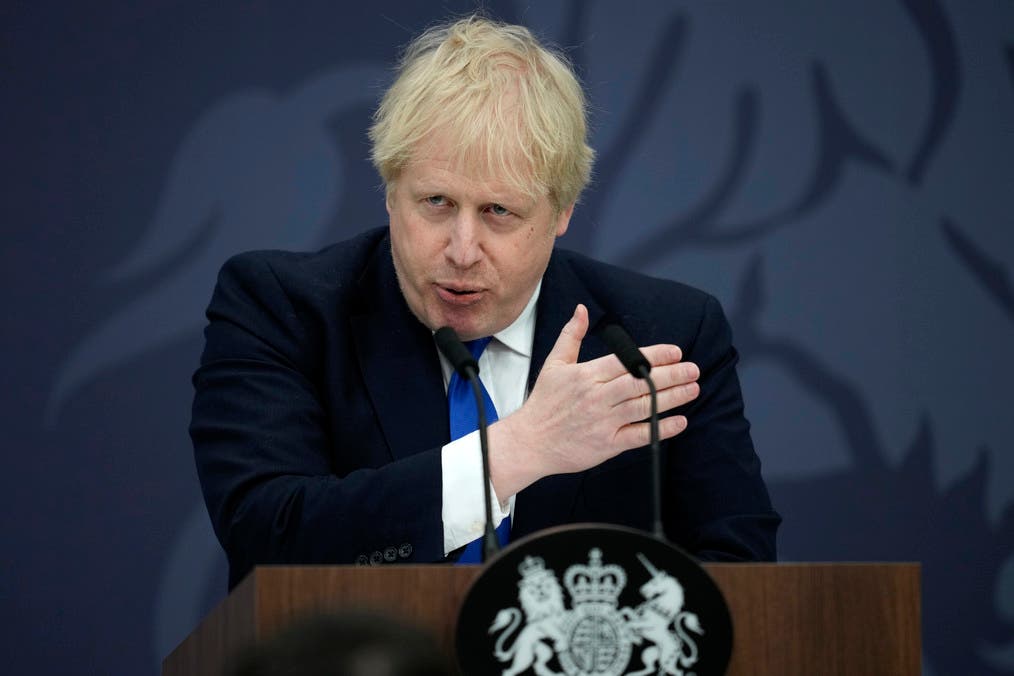Britain’s Conservative government has struck a deal with Rwanda to send some asylum-seekers thousands of miles away to the East African country, a move that opposition politicians and refugee groups condemned as inhumane, unworkable and a waste of public money.
For the latest healdines, follow our Google News channel online or via the app.
Home Secretary Priti Patel visited the Rwandan capital, Kigali, on Thursday to sign what the two countries call an “economic development partnership.” The plan will see some people who arrive in Britain in small boats across the English Channel picked up by the UK government and flown 4,000 miles (6,400 kilometers) to Rwanda, apparently for good.
Migrants have long used northern France as a launching point to reach Britain, either by stowing away in trucks or on ferries, or — increasingly since the coronavirus pandemic shut down other routes in 2020 — in dinghies and other small boats organized by smugglers.
More than 28,000 people entered the UK on small boats last year, up from 8,500 in 2020. Dozens have died, including 27 people in November when a single boat capsized.
Prime Minister Boris Johnson said Thursday that action was needed to stop “vile people smugglers (who) are abusing the vulnerable and turning the Channel into a watery graveyard.”
In a speech near the Channel coast, Johnson said “those who try to jump the queue or abuse our system” would be “swiftly and humanely removed to a safe third country or their country of origin.”
He said “anyone entering the UK illegally … may now be relocated to Rwanda.”
Rwanda confirmed the deal in a statement, but neither government provided full details of how it would work. The Rwandan government said the migrants would be given “a range of opportunities for building a better life in a country which has been consistently ranked as one of the world’s safest.”
Johnson denied that the move was “lacking in compassion” but acknowledged it would inevitably face legal challenges and would not take effect immediately.
Rwanda is the most densely populated nation in Africa, and competition for land and resources there has already fueled decades of ethnic and political tensions that culminated in the 1994 genocide in which more than 800,000 ethnic Tutsi and Hutus who tried to protect them were killed. Human rights groups have repeatedly criticized President Paul Kagame’s current government for being repressive.
Johnson, however, insisted that Rwanda had “totally transformed” in the last two decades.
Previous policies of sending refugee applicants abroad have been highly controversial. In 2013, Australia began sending asylum-seekers attempting to reach the country by boat to Papua New Guinea and the tiny atoll of Nauru, vowing that none would be allowed to settle in Australia.
The policy all but ended the people-smuggling route from Southeast Asia, but was widely criticized as a cruel abrogation of Australia’s international obligations.
British government minister Simon Hart said the arrangement with Rwanda will cost Britain about 120 million pounds ($158 million) to start. He said the goal was to “break up” the business model of criminal people-smuggling gangs.
Advocates for refugees said the plan was so extreme it was unfathomable.
Steve Valdez-Symonds, refugee director at Amnesty International UK, said the British government’s “shockingly ill-conceived idea will go far further in inflicting suffering while wasting huge amounts of public money.” He said Rwanda’s “dismal” human rights record made the idea even worse.
The chief executive of the UK-based Refugee Council, Enver Solomon, called it a “cruel and nasty decision” and predicted it would not stop people-smuggling gangs.
The British and French governments have worked for years to stop the cross-Channel journeys, without much success, often swapping accusations about who is to blame for the failure. Last year, the UK agreed to give France 54 million pounds ($74 million) to help fund a doubling of police patrolling French beaches
Britain’s Conservative government has floated other proposals, including building a wave machine in the Channel to drive boats back and sending migrants to third countries. Several earlier proposed locations for migrants to be sent to — including the remote Ascension Island, Albania and Gibraltar — were rejected, at times angrily, by the nations themselves.
The Rwanda plan faces hurdles both in Britain’s Parliament and in the courts. Johnson’s Conservative government has introduced a tough new immigration bill that would make it more difficult for people who enter the country by unauthorized routes to claim asylum and would allow asylum-seekers to be screened abroad. It has not yet been approved by Parliament, with the House of Lords seeking to dilute some of its most draconian provisions.
Opposition politicians accused the government of trying to distract attention from a scandal over government parties that breached pandemic lockdown rules. Johnson this week was among dozens of people fined by police over the parties, making him the first British leader ever found to have broken the law while in office.
He is resisting calls from opponents, and from some lawmakers in his own party, to resign.
Labour Party lawmaker Lucy Powell said the Rwanda plan might please some Conservative supporters and grab headlines, but was “unworkable, expensive, and unethical.”
“I think this is less about dealing with small boats and more about dealing with the prime minister’s own sinking boat,” Powell told the BBC.
Read more:
Rwanda to host asylum-seekers, migrants to UK in multi-million dollar deal
Toyota threatens to stop manufacturing in UK
Energy supplies from Russia still reaching UK ports, shipping data shows

 World3 years ago
World3 years ago
 World3 years ago
World3 years ago
 Business1 year ago
Business1 year ago
 Entertainment7 years ago
Entertainment7 years ago
 World7 years ago
World7 years ago
 Entertainment7 years ago
Entertainment7 years ago






